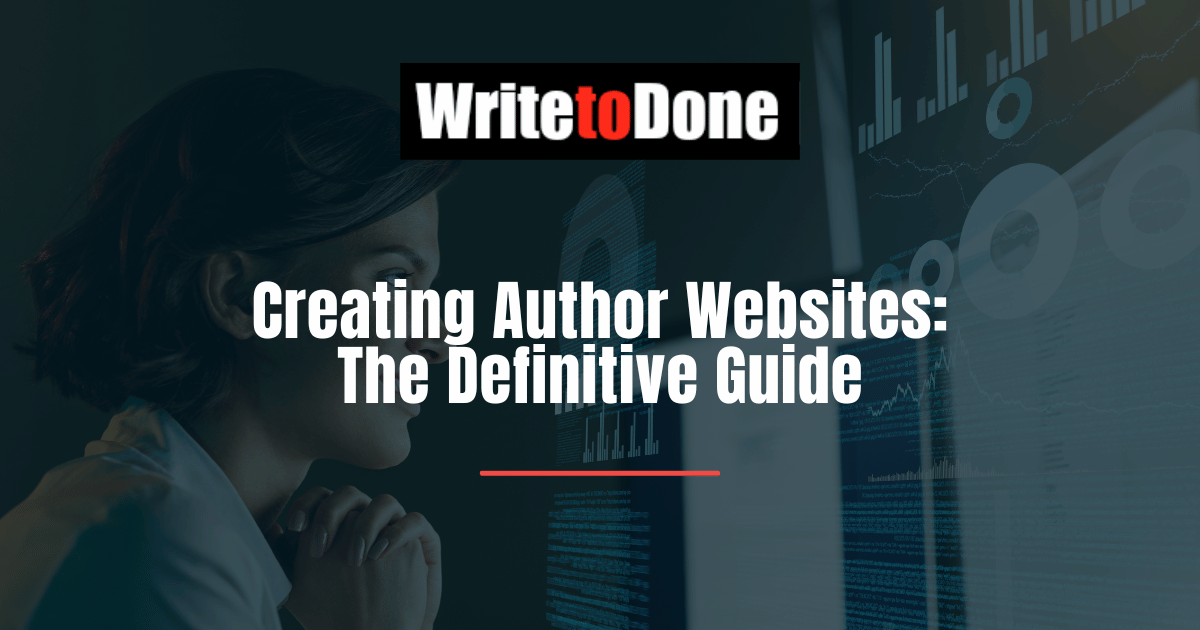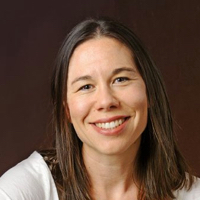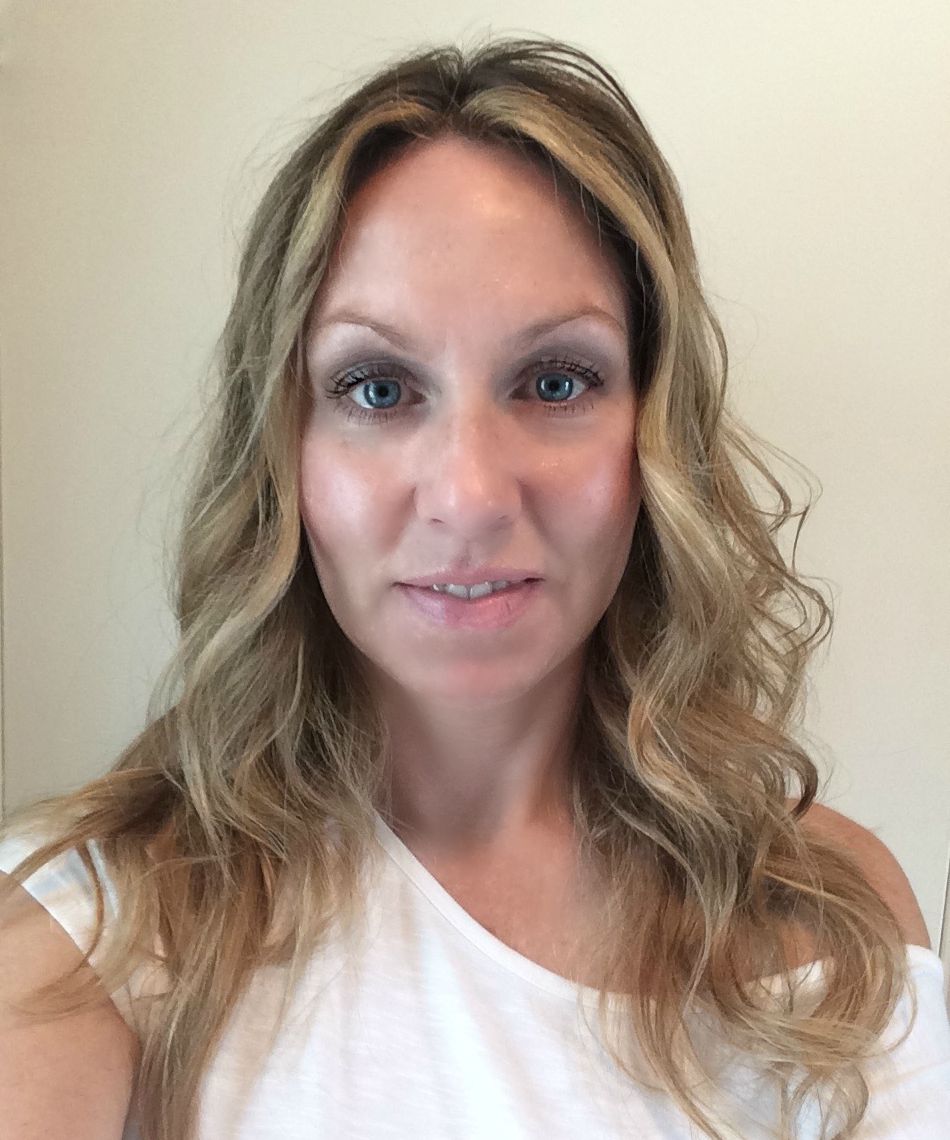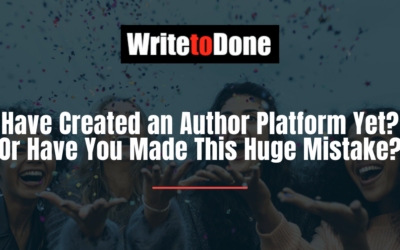If you want to be discovered as a writer, there’s an important question you need to consider.
Can agents, publishers and readers find you?
The bitter truth is, if you can’t be found, nobody can discover you.
In this post, you’ll learn how to be found by creating an author website.
I know about being discovered first-hand. Three weeks after I had published a few articles on relationships on a website some years ago, I was contacted by a publishing house and was invited to write Learn to Love, a book later translated into 7 languages.

I tell you, being discovered was a mind-blowing experience!
Read on to find out how YOU can secure your future success as an author.
Creating Author Websites
What’s your most important task if you want to become a published author: Practice writing, plan a book or create an author website?
Experts suggest creating an author website is one of the most important tasks for aspiring writers.
After all, your biggest problem as an aspiring author isn’t a lack of skill or the competition of other writers; it’s obscurity.
The most important function of an author website is to serve as your platform; the place where people can find you, your books, and your writing; to serve as a conduit for fans to connect and engage with you and others; to be a powerful calling card that sets you apart from other authors.
Whether you plan on writing a novel or a nonfiction book, you need to cultivate your audience before you write your book.
This holds true whether you want to self-publish or want to attract the attention of a traditional publishing house.
Here’s what the heavy-weight publisher Penguin Random House has to say about author websites:
A website gives authors credibility and acts as their home on the web, directing information-seekers to where they can buy the book, connect with the author on social media, or book the author for a speaking engagement. From: 10 Tips For a Successful Author Website.
Unfortunately, most aspiring authors don’t understand that you need to create an author website before you need it. It’s crucial to build it as early as possible.
 Joel Friedlander TheBookDesigner.com
Joel Friedlander TheBookDesigner.com
An effective author platform is built on the permission you receive from readers to interact with them on a specific topic. Through your interactions—articles, blogs, presentations, speaking engagements, and more—your platform will grow based on the authority, trust, and likability your audience sees in you.
The key things to consider when building an author platform are the persona you plan to inhabit; consistency of message, branding, and tone; and focusing your efforts on the places and methods of communication your specific readers prefer.
But what to display on your website, and what to write?
Read on and you’ll never run out of ideas for author websites. Promise!
The One Thing That Makes Your Writing Career Take Off
Author websites work well for both nonfiction and fiction writers. Below, you’ll find some great ideas on how to create author websites that build a raving fan-base.
Before I go into the details, let’s take a quick look at two different websites to see which one is immediately more attractive, and why.
Imagine you’ve browsed through Amazon and have downloaded a free Kindle book by a new author. You like it!
What’s the next thing you’re going to do?
Most likely, you’ll try to find them on the Net and then look at their website.
What would make you spend time on their author website?
The answer is simple: If there’s something to read.
Unfortunately, most author websites are as boring as bat’s piss.
Would you be keen to dig around in this website and read praise for Eric Rickstad?
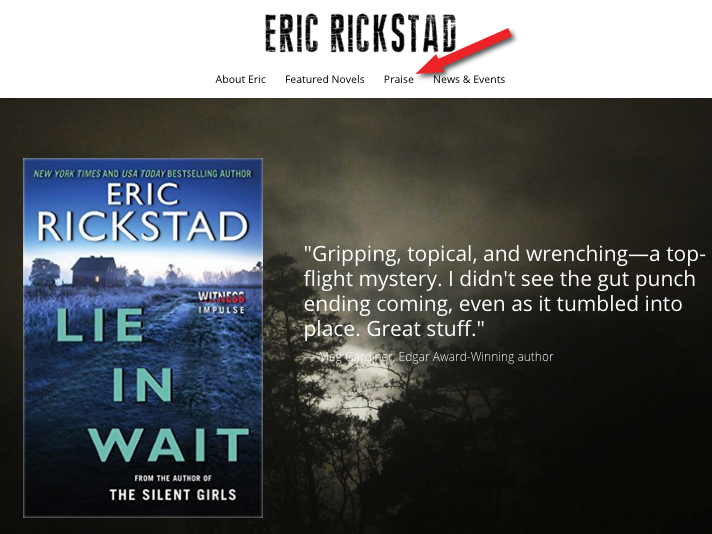
Or would you rather read this about Gillian Flynn, author of Gone Girl?
I was not a nice little girl. My favorite summertime hobby was stunning ants and feeding them to spiders. My preferred indoor diversion was a game called Mean Aunt Rosie, in which I pretended to be a witchy caregiver and my cousins tried to escape me.
You can see her cheeky autobiographical details in the image below…
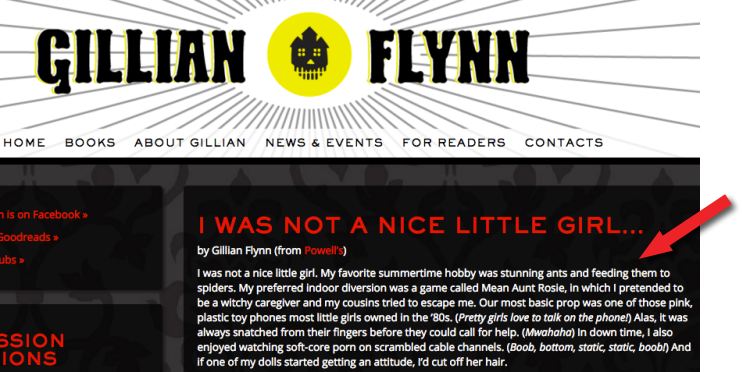
Gillian Flynn’s approach is a lot more interesting, right?
This is because she created her author website with readers in mind.
When you consider an author platform, the center is not a thing. Not a blog, a website, a podcast, or a marketing strategy. The center is the person you want to connect with — the head and the heart.
Let’s take a look at what exactly makes author websites work. First up are three websites by fiction writers and then we’ll take a close look at three nonfiction websites.
The Anatomy Of Creating Author Websites
A. Fiction Websites
Here are three fiction writers who have created excellent author websites. Just like the authors, each website has a unique character.
Example #1: Brad Thor
Brad writes thrillers. As you can see below, the design fits the genre. You’ll also notice a signup form for collecting emails.
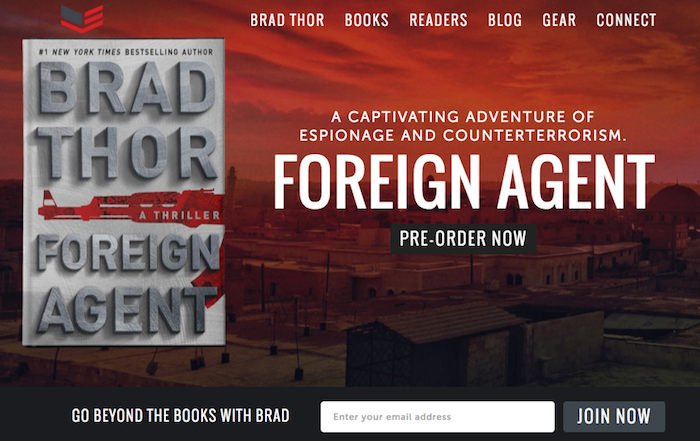
This website has some interesting features. For example, when you click on Reader Experience in the navigation bar, you get to a section where fans can deepen their experience of each of his books.
For example, in the section about his book, Code of Conduct, Brad talks about his protagonist, Scot Harvath.
In CODE OF CONDUCT, we find Scot Harvath in places he’s never been before. When his mission takes him into the heart of the Congolese jungle, he brings a rugged laptop and a mobile satellite tower to ensure he stays connected on the job.
Brad then describes the gear Harvath is using. The images of the gear are linked to sales pages. This is an innovative way to monetize an author site! Brad also runs a line of clothes for his fans, and has linked a Shopify site to his author platform.
Next up is a very different author, Elizabeth Chadwick.
Example #2: Elizabeth Chadwick
Elizabeth write historical novels. As you can see, the look of her website matches her genre.

Check out her welcome message below.
Please do come in and browse around. Here you’ll find the latest information about my novels and bonus pages taking you inside my research methods together with biographical information about the characters you meet in my books. The site will be updated and added to regularly so check in from time to time to see what’s new.
As you can see from the welcome message, this website is dynamic, which means that the site delivers regular, fresh content.
If I was interested in historical fiction, I’d track back to this site regularly. Wouldn’t you?
However, this website lacks something very important:
A form to collect email addresses.
We now come to our third example of a fiction writer’s author platform.
Example #3: Joanna Penn
Joanna has two author websites. One is for all her books and the other is for her thrillers.
Here is her general author platform: TheCreativePenn.com
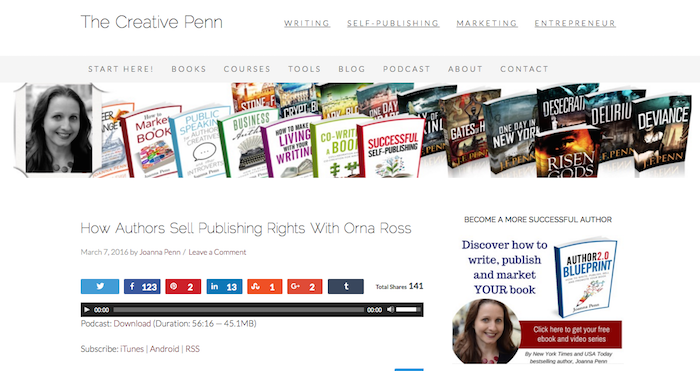
As you can see, Joanna is a prolific writer. Not only has she published numerous thrillers, she’s also turned her experience of writing into a row of books for writers.
The author website for her thrillers, J.F. Penn, is quite different in character.
Take a look…
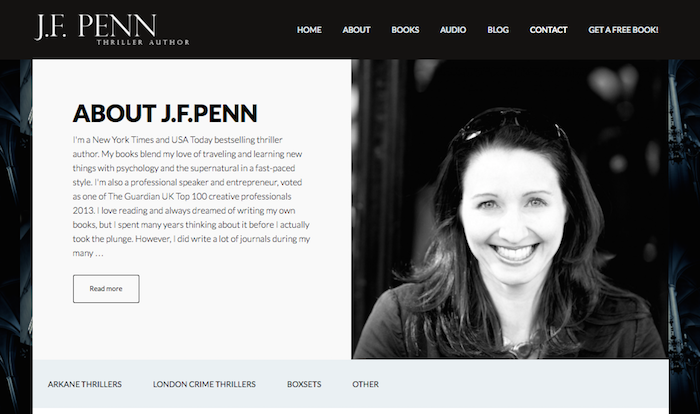
The design mirrors her genre.
Joanna has focused her author website firmly on her readers. If you scroll down the homepage, you can find links to articles like “What I’m working on right now” with updates of her progress.
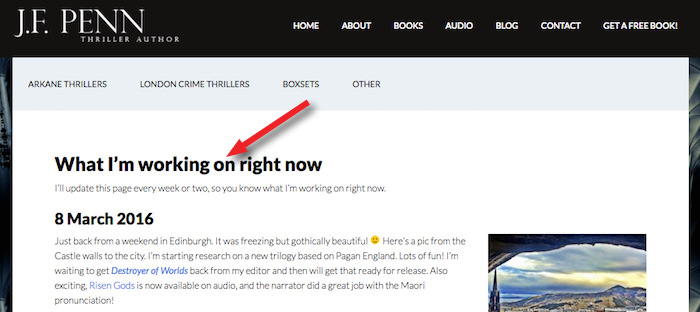
On both her author platforms, Joanna offers attractive opt-in gifts to build her email list. For example, on her thriller website, she has the following form:
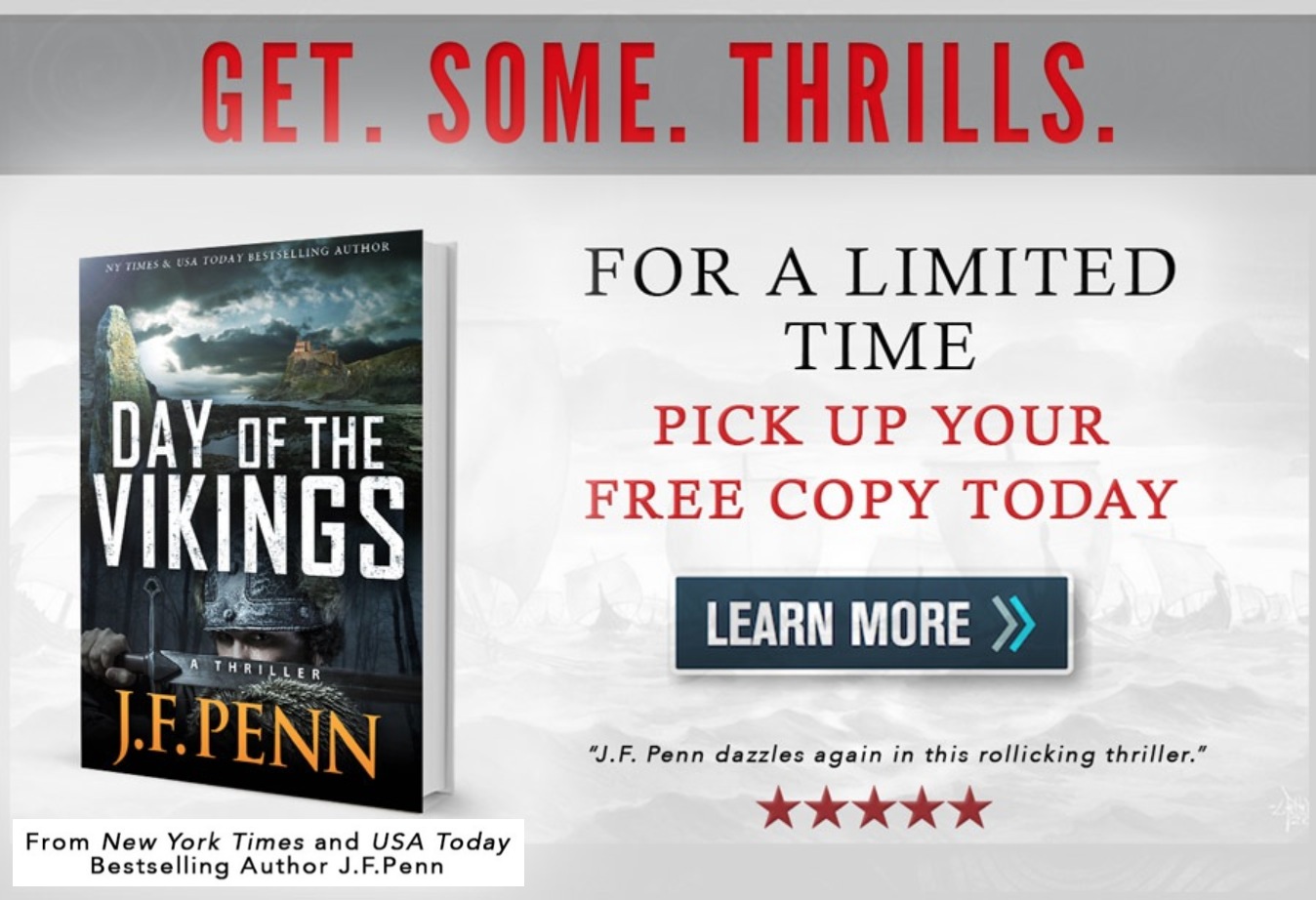
As you can see, Joanna Penn has found many different ways to attract and entertain her readers.
So, if you’re a fiction writer, what kind of content could you use on your author website?
Think of constructing your author website like the ‘special features’ section of a DVD. Offer additional information that the readers can’t get by reading your books.
Take a look at the following 10 tips for fiction writers. Some of these tips can be used right away, even before your book is written. Others work well once you’ve published your novel.
10 Tips for Fiction Author Websites
Tip #1: Publish deleted scenes and alternate endings.
There are always scenes that are cut out of the final novel. Readers enjoy reading them.
In his article, 10 Ways Proven to Draw Readers to your Novel’s Website, Thomas Umstattd has this excellent tip:
Mention this at the end of your book: ‘You can find hidden chapters and deleted scenes on my website.’ This will make people curious to see what got cut from the book.
Tip #2: Publish short stories.
If you’re a budding novelist, publishing short stories is a great way to begin. Consider writing short stories about some of the protagonists in your upcoming book.
If you’ve already published a book, you fans will love reading short stories about their favorite characters.
Tip #3: Answer reader questions.
Many readers have questions. Instead of answering them individually, create a page on your site with answers to common questions. If you are not yet a published author, you could create and publish questions that your friends or family members have asked you about your project.
Tip #4: Show the status of your upcoming book.
Let the reader know how your upcoming novel is progressing. You can even include a progress bar. Here are two progress bar plugins: Author Work in Progress and My Book Progress.
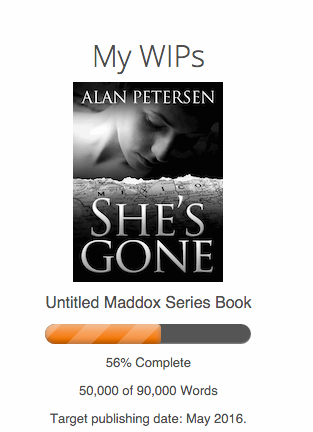
Tip #5: Preview your upcoming book.
Give your readers a taste of the book you’re writing. You can even publish a chapter or a scene and give it away as a download.
Tip #6: Promote email signup.
You need to display a signup box or popup on every page of your author website to get readers to subscribe.
The most important function of author websites is not to sell books, it’s to grow an email list.
I’ll talk more about collecting emails in a moment. Here is how Lisa Unger promotes her email list:
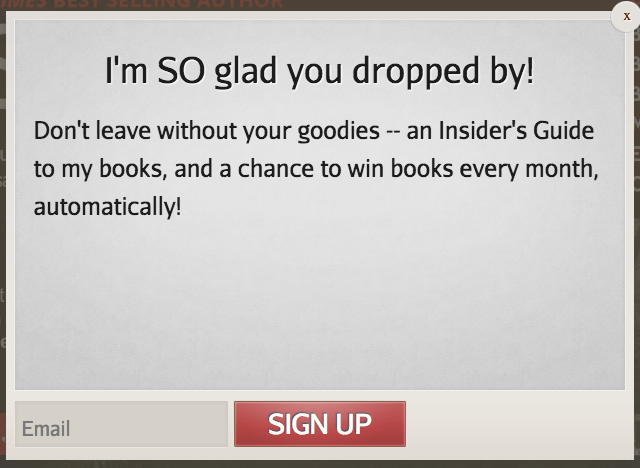
Tip #7: Share research.
Readers love to be part of your creative project. That’s why it’s a great idea to share your research of locations or historic events. For example, you could show images of your chosen locations and write about why you chose them for your novel.
Tip #8: Offer book recommendations.
Consider recommending other books in your genre. Your readers will be grateful and the authors you mention may become your friends. You can create regular updates about new books while you’re still writing your novel.
Tip: If you recommend books, make sure you become an Amazon affiliate so that you get a modest income from your author platform.
Tip #9: Create a podcast.
A podcast about your creative journey with snippets about your upcoming book can be an attractive feature of author websites.
Tip #10: Create a video series.
A video series on Youtube where you talk about your books or your creative process can be a drawcard for your fans.
As you can see from these ten tips, there are many ways to create an attractive author platform if you’re a fiction writer.
Every author’s platform is as unique as a fingerprint. We each have different backgrounds, resources, networks, and strengths to draw upon. Each author must consider what they can do on a long-term basis that is sustainable for them, that fits with their goals and standards of success.
Next, let’s take a look at examples of nonfiction websites.
B. Nonfiction Websites
If you aspire to write a nonfiction book, running an author website is the easiest way to create your book. It also works wonders, once you’ve published your book.
The reason an author website makes it easy to create your book is because you can publish articles or posts on your website and then use them as a basis for your book.
In order to publish regular new content, you need a dynamic website built upon a blogging platform like WordPress.org.
Let’s take a look at three authors who started creating their books by publishing articles on their website.
Example #1: Joy Bauer
Joy Bauer’s website is about health and nutrition.

In this author website, you can find a massive amount of information about nutrition and health.
Whether you want to lose weight or want to know which foods to avoid if you suffer from arthritis, you can find the information here. As you can imagine, people who subscribe to this website will return again and again. And they’ll want to buy Joy’s books!
Example #2: Yuval Noah Harari
Prof. Yuval Noah Harari is the author of the international bestseller Sapiens: A Brief History of Humankind. He pulls out all the stops on his website.
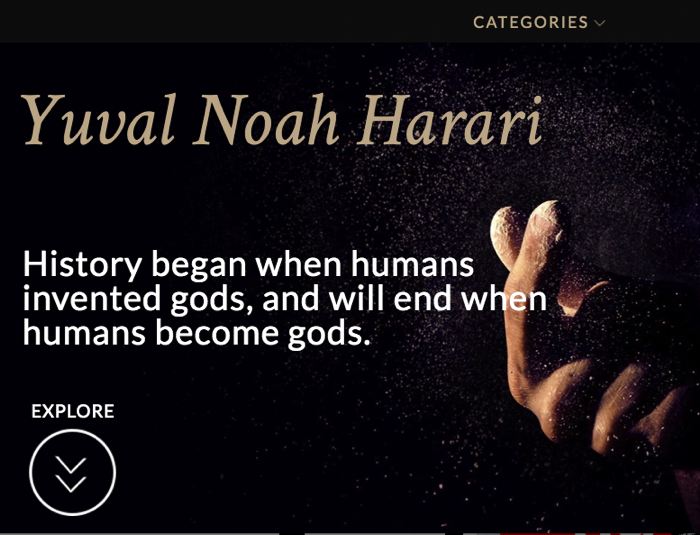
Yuval’s website is interactive. He poses questions and answers them in videos and short articles. For visitors, this website is a journey of discovery.
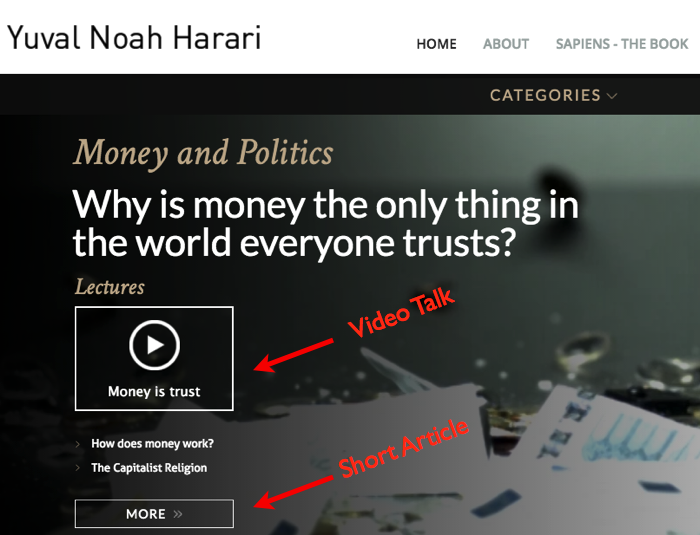
Once you’ve watched the videos and read the articles, you’ll want to buy his book—which is the main purpose of this website.
Unfortunately, Yuval’s website lacks email signup forms.
Remember, building an email list is crucial because you can start to build and nurture a fan-base.
Example #3: Jen Sincero
Jen Sincero is a success coach for women.

Jen’s book has catapulted her into the limelight. Her author platform is firmly focused on gathering reader emails. As you can see in the image above, she has a signup form right in the header of her website.
Readers also see Sumome’s Welcome Mat when they arrive at the website:
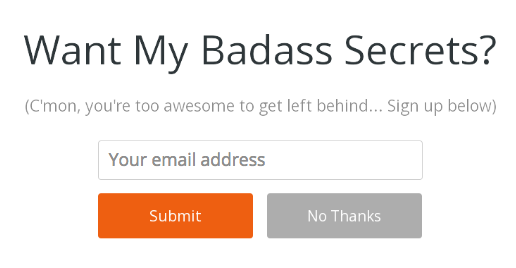
As you can see, each of the three authors above has created attractive platforms. Each website is unique, yet they all share common strategies. Check out the following tips for nonfiction authors.
10 Tips For Nonfiction Author Websites
The following tips will give you some fresh ideas on what to use on your nonfiction author platform.
Tip #1: Publish regular fresh content.
When you publish a range of articles related to your chosen topic, you’ll be regarded as an expert. Publishing fresh content regularly makes for a vibrant author platform.
Tip #2: Promote email signups.
Make sure every page on your website shows a signup form or a popup which encourages readers to sign up to your email list. Check out Joel Friedlander’s post Why Building an Email List is Essential For Authors.
Tip #3: Create a Lead Magnet.
A lead magnet is a gift with which you reward new subscribers. The most effective lead magnets are tip sheets or resource lists.
Tip #4: Offer a quiz.
Readers love quizzes! Check out the successful quiz we created on WritetoDone on grammar tips for writers.
Tip #5: Answer reader questions.
If you look through the comments, you’ll find a wealth of reader questions you can answer.
When publishers talk about authors who have great platforms, they are generally referring to authors who have great websites and/or blogs (meaning interactive, functional, and with a clear and easy-to-find sign-up form); authors with a high number of followers across various social media platforms; authors with previous publications (of either books or articles); and authors who already have a fair amount of media exposure under their belts—through a list of public speaking engagements, YouTube videos showcasing their talents, radio links, TV footage, and/or a media packet.
Tip #6: Create roundup posts.
You can become a trusted authority about a topic by researching and gathering information from other writers. Inform the authors you link to about your post and ask them to share it on social media.
Tip #7: Create challenges.
You can energize and motivate your readers by issuing challenges. For example, Are You Ready For The Great Writing Challenge 2016 got over 660 comments.
Tip #8: Create contests.
Contests are a great way to create buzz on your website. Make sure there’s an interesting prize at the end. You may need to ask for a small registration fee to fund your prize.
Tip #9 Show the status of your upcoming book.
Even if you haven’t started writing you book yet, refer to it on your About page. You can say you are …the author of the upcoming book [Title] and give an approximate publishing date. This will give you authority and motivate you to complete your book.
Tip #10 Use multimedia.
You can incorporate images, videos, slide decks, or podcasts on your website.
As you can see, nonfiction writers have many options for creating an arresting author website.
But how to create it?
That’s the question we’ll explore in the following section.
Creating Author Websites: How To Do It
One of the questions I get asked regularly is: ‘Should I create one author website for all the books I’m planning to write, or should I create a separate website for each book?”
Nina Amir has some good advice:
Build a platform that serves you and all your projects now and in the future. Create a career plan that includes all the books or blogs you plan to write. Then build an author platform with this in mind.
The following sections explore which domain name to choose and what kind of website to create.
What Domain Name Should You Choose?
The answer is simple: use your own name or your chosen pen name as your domain name.
This is a valuable long-term strategy.
In a moment, I’ll show you how to get a free, personal domain name.
 Tim Grahl
Tim Grahl
A web search is the first place people go when looking you up and you want to make sure they find a website that you own and have control over. It allows you to put your stake in the ground and own your own little corner of the internet.
What Platform is Best For Future Success?
There are a lot of free options out there. You can use WordPress.com or other free website platforms.
However, it’s important to remember that all free options have a crucial downside.
You see, if you build your online platform on a free blogging service or on Facebook, the platform doesn’t actually belong to you.
You can gather thousands of subscribers on a free blogging platform or collect numerous ‘Likes’ on Facebook, but all your work can be wiped out overnight because the online platform belongs to someone else and they can change the rules at any moment.
I’ve seen quite a few authors caught out because someone else grabbed their domain name ahead of them and now get a lot of the traffic.
Buying a domain costs under $10 dollars, and you can even get your domain for free from a good hosting company. It’s very important to use a reliable hosting company that is good AND cheap.
CLICK HERE to get a special Bluehost Discount. This includes hosting for only $7.99 $3.95/month and…
- FREE Domain Name
- FREE SSL Certificate
- 1-Click WordPress Install
- 24/7 Support
I think $3.95 is a small price to pay for ownership of your virtual real estate!
An Author Platform is a bridge between the work you create, and the people who are meant to experience it.
Think long-term when creating your author website.
As Joanna Penn confesses in the quote below, she made a crucial mistake early in her career. Read the complete quote to see what her mistake was and what she learned from it.
 Joanna Penn
Joanna Penn
Think long-term when creating your author platform, because you will achieve what you focus on. Consider what you want to be known as in 5 years time.
Joanna Penn’s advice to think long-term is excellent. You need to dream big and plan accordingly.
Which Kind of Design Works Best?
Here are some simple tips which make creating a stylish author website a cinch. Most importantly, the tone of your website needs to match the tone of your writing, like a good book cover.
- Theme matches your genre. There are many free themes out there. If you use SiteGround, you can immediately choose some good, free themes to get your site up and running.
- Readable font color. Use a dark font on a light background. You need to steer away from white text on a dark background because it’s hard to read.
- Mobile-ready. Most new themes these days are mobile-ready. This is important because over 80% of readers now use mobile devices to access websites.
- Use of white space. This is a design term which denotes space on a website that is empty of text and images.
- User-friendly navigation. Use a navigation bar under your header.
- Signup forms. Use signup forms on every page so that the reader can subscribe. Make sure there is a form in the sidebar and also use a popup so that you get a high signup rate.
- Social share buttons. Social share buttons should show at the top and bottom of every piece of content. You can also ask readers directly to share on social media.
As you could see from the author platforms I showcased before, an author website can lead to having a larger platform which includes speaking engagements, podcasts, video series, and so on.
 Trena White
Trena White
When you’re thinking about building your platform, it’s important to consider the many different elements of platform (for example: speaking engagements, workshops you offer, articles you write), and figure out which of them are most comfortable and natural for you to expand.
Once you have created your author website, you need to consider what kind of writing style to use.
What Are Must-have Elements of Author Websites?
An author platform needs four important elements:
1. About Page
This is a place where you introduce yourself to present and future readers. This is what readers want to know:
- Who are you? What is your life like? What are you passionate about and what are your idiosyncracies?
- What do you look like?
- What do you write? What inspires you? What authors do you like?
- How and where do you write? How do you get your ideas?
- What have you written? If your first book is still a work in progress, give it a title and say, ‘I am the author of the upcoming book [Title]’
 Jennifer Mattern
Jennifer Mattern
The key thing you should consider when creating an author platform is your target reader. Everything else about your platform revolves around that audience. Everything you do when building your author platform, from participating in speaking engagements to building your email list, needs to be targeted to these people.
2. Contact Page
If you want to interact with your readers or with agents and publishers, or get speaking gigs, you need a Contact page. It’s easy to set up, just use a free plugin like Fast Secure Contact Form so that you don’t need to broadcast your personal email address.
3. Book Page
Whether your book is still in the planning phase or is already published, you need to tell your readers about it. If your book is a work in progress, give it a title and talk about ‘my upcoming book.’ Use the title of your planned book a few times and offer some interesting information about it, as well as letting your future fans know the planned publishing date. You can find more ideas on creating your book page on Tim Grahl’s site on building author platform.
4. Content Page
This is a page for regular, fresh content on which you publish articles, videos, podcasts or other kinds of content. If you use blogging software like WordPress.org, you can use this content page either as a home page or link to it in the navigation bar. You can refer to it as Blog, Articles, News, Writings, Updates, Topics or Stories.
Creating an author website takes work and dedication. But it’s worth it!
Creating an effective author platform can be done at little economic expense, but it requires time – time spent identifying reader communities, time spent creating content, time spent sharing that content, and time spent building relationships with readers.
What Writing Style Should You Use on Author Websites?
Writing for your author website should be easy, right? After all, you’re a writer, so where’s the problem?
Actually, there is a challenge. And that is that you need to write differently on your website than in your books.
This is where it gets tricky…
If you are uploading fiction to your website, then you need to use the writing style your readers are used to. However, if you write articles for your readers about subjects related to your genre or your writing, you need to use a style that your readers will read.
People reading online have much shorter attention spans, so you need to adapt your style accordingly, using shorter paragraphs and other strategies to capture and hold your readers’ attention.
Some experts suggest that finding your voice is one of the first things to focus on when you create content on your author website. Jeff Goins has something very interesting to say about this.
 Jeff Goins
Jeff Goins
I think the most important thing for an author to do is find their voice.
Some people will tell you to blog or start an email list, and all those things are great, but I wouldn’t start there.
Yes. Do those things. Blog. Capture emails. Do the social media dance. But be careful what kind of tribe you attract without having first found your voice. If you build an audience without knowing what you have to say, then you’re no good to anyone.
How To Promote Author Websites
Once you’ve created your author platform and published some pages, it’s time to promote your site.
There are many different ways to do this. But the key factor is the same: you need to get other people to share your content.
Whenever someone shares your post with others, there is a multiplication effect. Instead of you sharing your content one-on-one with people you know, your content reaches people you’ve never met. The most exciting form of this multiplication effect is when your content goes viral!
Of course, a prerequisite for this to happen is to write share-worthy content.
Anything you write for your website can be repurposed. You can tweak the content and write a guest post, or you can create podcasts, videos, slide decks on Slideshare or infographics with the same information.
10 Strategies to Promote Your Author Platform
1. Email
Every time you create new content, send out an email to your list and let them know about it. Include a link for easy access and ask your readers to share your content on social media.
2. Twitter
One of the simplest ways to promote your content is to place social share buttons on your site. These share buttons need to be mobile-ready.
I’ve tried many different share bars but each had its drawbacks. I now use Social Warfare which is an outstanding share bar. One of the best things about it is that it brings your Twitter share numbers back!
In addition to your social media share button, you can also set up tweetable quotes in your piece of content. You can use the free service ClicktoTweet.com to set up your quotes. This will heighten your Twitter shares for each post.
With Social Warfare, you can quickly create special images for Twitter and Facebook for each piece of content. This means that your special images will appear automatically when someone shares your content. After all, the images you use on your website are not necessarily the right size for social media and tweets with images are shared twice as frequently as tweets with text only.
Remember, social media is social. It is all about forging a connection emotionally, which is what we do all the time in fiction. Readers bond with elements of who we are when they fall in love with our books. Social media simply allows us to recreate the feelings readers love and cultivate that emotional tether they crave.
3. Facebook
One of the decisions you need to make is whether to use your personal Profile or a Page on Facebook. A Profile is for individual users, which allows people to either friend or follow you. Experts like Jane Friedman suggest using the personal Profile as your ‘author platform’ on Facebook.
However, Lisa Hall-Wilson warns that there’s a danger of breaching the Code of Service for personal profiles by being too promotional.
4. YouTube
Talking to your fans via videos is just one of the many ways you can promote yourself on Youtube. Tell them about your writing process or about your protagonists. Your readers will love it!
Author Garrett Robinson goes a step further. He writes his novels live on Youtube and calls the process VlogaNovel.
VlogaNovel is great! It keeps me very productive while I’m producing. Having my audience along for the ride is very fulfilling. And it’s something unique, that not a lot of other authors are doing.
I asked Garrett, “What about copyright? Aren’t you nervous that someone is going to take your idea and use it?”
Garrett said, “Not at all! I mean, I’m literally on record creating those words. If someone stole them and published them, I could sue the everliving pants off them!”
5. Podcast
Creating a podcast is a great way to deepen the connection to your fans. You can interview other writers in the same genre, share snippets of your upcoming book, or talk about your creative process. You can interview other writers in the same genre, share snippets of your upcoming book, or talk about your creative process.
6. Republish on Medium
If you’ve created content and want more readers to enjoy it, consider republishing it on Medium. Check out the Guide to Blogging on Medium.
As author Cliff Watson says:
“Over the years, I’ve published my writing in dozens of places on the Internet. More people read a single Medium post than everything else combined.” —Cliff Watson
7. Republish on Pulse
Pulse is a platform created by LinkedIn. It’s a great place to republish your content! The Beginner’s Guide to Publishing on Pulse is a useful resource.
8. Guest posts
Guest posting is a great way to spread your content. If you write regular guest posts, your email list will grow fast. Check out how to get your guest post accepted.
9. SlideShare
A great way to repurpose content is to create a slide deck and publish it on Slideshare.com. Check out how to get insane amounts of traffic from Slideshare.
10. Infographics
You can also repackage your content as an infographic. You can create Infographics in minutes with a free online software called Piktochart.
As you can see, there are many different strategies to promote author websites. Think of each of the ten strategies above as a channel that attracts a certain kind of audience. The more channels you use, the more traffic your website will get.
Your most important assets in your drive for success are the connections you make. Bryan Hutchison has an important message about this below.
Bryan Hutchison
The best advice I can give on creating author websites is to network, network, network from the get-go. Influencers are great, but you want to network with those who are in the trenches, just like you, trying to get noticed.
Creating Author Websites Final Thoughts
Now that you’ve read this article, you’ll have a lot of new information on how to go about creating and promoting an author website which has traction and can secure your future success as a writer.
However, as Bryan points out in his quote above, the most important thing is the human element. Because you are not alone in your struggle for visibility. And, when you connect with your peers, helping them to promote their content, magic happens.
As you can see in this article, experts all suggest creating an author platform. It may feel overwhelming. But it’s easy to create an author website and stake your claim online.
When’s the best time to create an author website?
The best time is now.
What are your thoughts on this? Please share this article on social media.
About the Author
Mary Jaksch is the Editor-in-Chief of WritetoDone. Check out her free training, 5 Powerful Online Writing Strategies for More Shares, More Subscribers and More Success. Mary has trained over 5,000 successful writers and bloggers.

